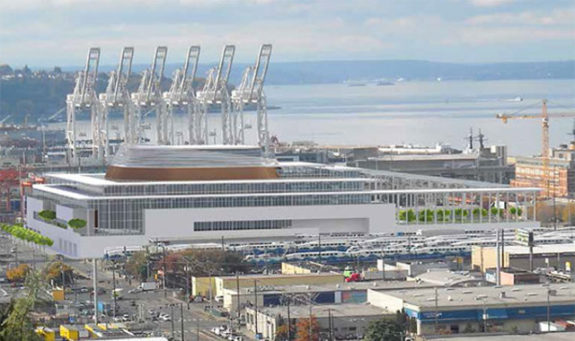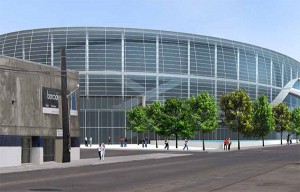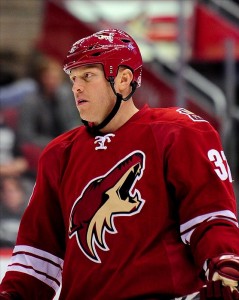
Buoyed by strong, local ownership and a relentless desire to see both the NHL and NBA in the Emerald City, the Seattle arena group made an appearance in New York last Wednesday, as the Chris Hansen-led team made its case for the NBA to approve their purchase of the Sacramento Kings. If ratified, not only will the acquisition pave the way for the return of the Seattle Supersonics as soon as the 2013-14 NBA season, but the door will be opened wide for an NHL franchise relocation as well.
“I do think it was a very positive meeting,” said Seattle Mayor Mike McGinn afterwords, assessing the tenor of the two-hour presentation to NBA Commissioner David Stern, other league representatives and a group of 12 NBA owners, all representing the league’s finance and relocation committees.
Step One: The Plan
Hedge fund manager and Seattle area native Chris Hansen has spearheaded the plan to not only bring back the Sonics, who were shepherded out of town by Oklahoma City oil baron Clay Bennett in 2008, but to attract an NHL franchise as well. As recently as the 1990s, Seattle was very much on the NHL’s radar screen, but a low-budget renovation of Key Arena did not redesign the facility to NHL specifications, ending the opportunity. With the recent effort, a brand new, 18,000+ seat facility suitable for both the NHL and NBA has been designed, approved, and presently is in the midst of the due diligence process. Renderings of the proposed bowl appear here.
The $490 million arena will be approximately 60% privately financed, with $200 million coming from city and county-backed bonds, paid for by user fees completely generated by the new facility.
Step Two: The Acquisition of An Anchor Tenant
After securing city and county approvals, the next step in the process was acquiring an anchor tenant. Although the NHL has always been an explicit goal, the investment group realized that achieving the return of the Sonics would galvanize the local community — not to mention the project itself. Thus, a binding agreement between the Seattle group and the Maloof family to purchase 65% of the Sacramento Kings for $365 million was announced on January 21st, 2013. Furthermore, Chris Hansen agreed to purchase another 7% of the team for $15.1 million at the end of March, bringing his total to 72% of the franchise. Also during March, the Seattle group formally applied to the NBA for approval to relocate the franchise for the upcoming NBA season.

Although the purchasers are without question well-heeled and highly qualified in all respects, the NBA must still approve the deal. Regardless of the outcome, precedence will be set, as a strong local ownership group out of Sacramento has emerged and entered a competing bid for the team, as well as outlining an arena plan of their own. The NBA has never blocked relocation when local efforts failed (which happened in Sacramento up until the point the new group surfaced) and the purchasers were financially viable. On the other hand, the NBA has also never never declined a legitimate plan to keep a team in its existing locale, provided that city has demonstrated sufficient support for its team. To further complicate matters, basic contract law may come into play, as all elements of a valid contract are currently in full force and effect with the Seattle deal.
Step Three: A New York Minute
Groups representing both the Seattle and Sacramento contingents made their cases in New York on Wednesday. The Seattle team included Mayor Mike McGinn and King County Commissioner Dow Constantine, who expressed the area’s strong political support for the relocation. Chris Hansen led the presentation, which highlighted the much larger market Seattle offers to the NBA, its proximity as a gateway to Asia, the 41-year history of the Sonics, the strength of the local economy, the viability of the ownership group and other key factors. Microsoft CEO Steve Ballmer, a key member of the proposed ownership group, gave an energetic, impassioned closing speech at the end of the two-hour presentation. “We’re optimistic,” Hansen said after the meeting. “The ownership group is very enthusiastic, and we appreciate the NBA has got a tough decision to make, and we’re hopeful for an outcome in our favor.”
A Sacramento-based group made their pitch for the league to reject the Seattle proposal later in the day.
“I truly say that we’ve got an A-team that brought their A-game,” said former NBA star and current Sacramento mayor Kevin Johnson. “I’m thanking the commissioner and all the owners of both committees that allowed us to tell our story. They were opened-minded and they let us get to the facts of the nitty-gritty. We got down to the nuts and bolts.”
After the historic day was over, NBA Commissioner David Stern spoke.
“We heard a day full of extraordinary presentations of a complex real estate, arena, construction timelines, potential obstacles and team funding in two really great cities,” Stern said. “It was a long day without any breaks, and both sides made, in my view, very strong presentations.”

The league indicated that it may make its decision at the April 18th Board of Governors meeting. On the other hand, given the complexity of the situation and the stakes involved, it may carry over beyond that date. It cannot go much further, as schedules and logistics for the 2013-14 season need to be decided. One thing the NBA has made clear: expansion is not an option. One city will walk away without a team when it’s all said and done.
Step Four: The NHL?
Although by no means a certainty, it seems likely that the league will ultimately ratify the Seattle deal, as the rumored purchase price is higher and the economics of the city give it the clear upper hand over Sacramento, which is also a year behind in terms of the political process. If so, the next big step is finding an NHL team to serve as co-anchor tenant. Seemingly, the most probable NHL franchise on the radar screen is the Phoenix Coyotes, who were in escrow to be purchased by former San Jose Sharks CEO Greg Jamison until his inability to arrange financing quashed the deal.
Jamison is still attempting to resurrect the deal, and Quebec City is more than a viable option as well, but in the wake of the Thrashers’ relocation to Winnipeg, it may be desirable for the league to move the team to another American city instead of appearing to be contracting in the U.S. — especially one in close proximity to its existing western and northwestern markets.
It is all but inevitable that Seattle will obtain NHL and NBA franchises at some point in the near future. If either the the Phoenix Coyotes or Sacramento Kings do not pan out due to one reason or another, a new arena in the 12th largest U.S. market serves as a shining beacon for existing economically-challenged franchises.
As washed up former has-been David Hasselhoff once apologetically said about his work-in-process web site: stay tuned.